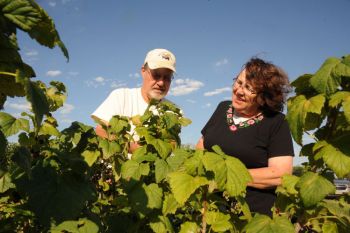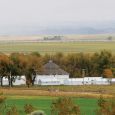The Gift of South Dakota
Subscriptions to South Dakota Magazine make great gifts!
Subscribe today — 1 year (6 issues) is just $29!
Growing Something Special
Oct 27, 2020
It’s October, which means the hops have been cut and baled, the aronia berries shaken from their bushes and frozen and the flax swathed. No, agriculture isn’t all corn and beans in South Dakota.
In the September/October issue of South Dakota Magazine, we featured a handful of farmers who grow more unique crops. They include ancient grains, the tiny cones that give beer its flavor and perhaps the healthiest berries on the planet.
Jeff and Jolene Stewart initially thought chokecherries were growing on their farm in Idaho, but after investigating they discovered the tiny fruits were aronia berries. When they moved to a farm near Wagner in Charles Mix County, they planted a row in a windbreak just to see what would happen. The shrubs flourished. The Stewarts learned more about the powerful aronia berries, explored marketing and sales opportunities and now tend about 10 acres.
Aronia berries contain the highest antioxidant levels of any known cultivated berry or fruit. They are rich in anthocyanins, which give them a dark purple color and also promote joint health and improve circulation. A handful of aronia berries a day has also been known to help digestion and protect the liver from chemical damage.
Just a couple counties to the east on the edge of Yankton, Ryan Heine and his wife, Michelle Donner, grow 5 acres of hops on their 6th Meridian Hops Farm. Heine grew hops to use in home brewing when they lived in the Omaha suburbs, but when he and Michelle decided to give their children the rural life they had enjoyed (both grew up in northeastern Nebraska, just across the Missouri River) he greatly expanded his hops crop.
Hops grow as cones that are stripped from the plant, dried, baled and frozen. During late fall or early winter, the hops are milled into a powder and pressed into pellets, which are then sold to brewers throughout the Midwest. Their alpha acids act as bittering agents, used to help balance the sugary sweetness of the wort during brewing. Their natural antibacterial properties help reduce the chance of beer spoilage and contamination. They also impart a wide range of aromatics. More than 250 essential oils are found in hops, which give beers flavors such as citrus, pine, melon or stone fruit. 6th Meridian’s signature hop is the Dakota Challenger, a key ingredient in the West Side Park IPA brewed at Ben’s Brewing Company in Yankton.
In Clark County, Gene and Wanda Bethke were looking for a way to diversify their 1,200-acre corn and soybean farm, so about 15 years ago they tried flax. “Flax used to be grown on a regular basis around here, but it wasn’t grown for the seed,” Wanda told us. “It was grown for the straw. They made cigarette paper and different things out of the flax straw. Now we don’t do anything with the straw anymore.”
Flax is among the world’s oldest crops. It was cultivated as early as 3,000 BC. More modern research has revealed that flaxseed is rich in the plant form of omega-3 fatty acids called alpha-linolenic acid (ALA), which has been shown to be heart-healthy. Flaxseed is also high in fiber and lignans, an antioxidant.
The Bethkes built their own packaging facility and sell flaxseed through their business, Purity Seeds USA.
Our feature also included garlic, flower and mushroom farmers who each add to South Dakota’s agricultural economy in their own colorful way. And there are no doubt many others who are working the soil and making a living by growing something special.











Comments